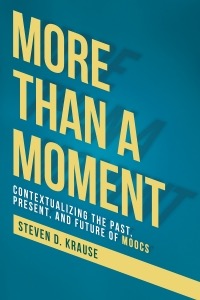MOOCs
Select an item by clicking its checkbox
Date Reviewed: June 17, 2021
Krause writes about his own experiences as a participant in several MOOCs and the experiences of faculty who developed and taught MOOCs. Contrary to many early claims from educational entrepreneurs, they were never entirely “new,” and MOOCs and their aftermath are still at the heart of the tensions between nonprofit universities and for-profit entities, particularly online program management firms, in delivering distance education.
While MOOCs are no longer a threat to education in the United States, they are part of the ongoing corporatization of education and remain part of conversations about experienced-based credit, corporate training, and open education. Presenting historical, student, teacher, and administrative perspectives, More than a Moment is a well-rounded treatment that will be of interest to academics and entrepreneurs interested in distance education, online pedagogy, online program management, and public-private partnerships in higher education. (From the Publisher)

Furthering Higher Education Possibilities through Massive Open Online Courses
Date Reviewed: December 12, 2017
Twelve articles clustered in four sections under this ambitious title evince a desire to promise revolutionary changes that have been associated with Massive Open Online Courses (MOOCs: term-based courses available to the mass free of charge via online media). The authors are truthful to this vision, offering vast ranges of topics including distance learning, open learning, innovations, academic administration, business management, and educational technologies. The book includes a detailed table of contents that provides a concise synopsis, and each chapter concludes with an extensive list of references and other resources.
Section 3 offers two articles with case studies. The first features a MOOC that deals with the problem of bullying in schools. It reflects on the use of test cases and finds that timely feedback is critical. The second examines LMOOCs (language MOOCs) that facilitate foreign language acquisition with the aid of mobile platforms. In LMOOCs, mobile devices function not only as a portal to the course site but also as a gateway to real-world language environments. The final section, which contains one chapter, outlines a planned course on mechatronics in a hybrid format, combining the benefits of the face to face approach and a MOOC.
The major strength of the book is that it provides guidelines for the implementation of MOOCs in practical terms, away from the clichéd terms (such as “revolution,” “hype,” or “innovation”) that are often associated with them. While the MOOCs revolution is rumored to be coming to an end, the authors assign to the movement a role that could still be made to higher education. To this end, the book calls for pedagogical refinements as well as a clear analysis of the financial viability of MOOCs.
Parenthetically, most of the authors assembled in this volume hail from social and geographical locations with European hues. It leaves one to wonder whether claims in this book would have been different if it also included North American or other global contexts, where the movement of MOOCs was born and is still growing.
